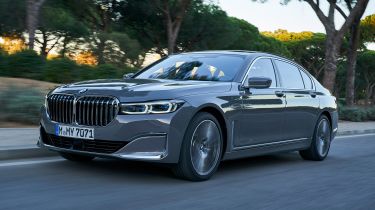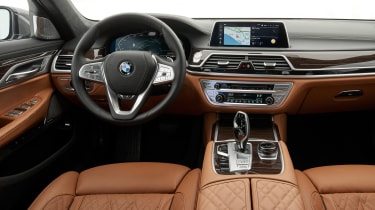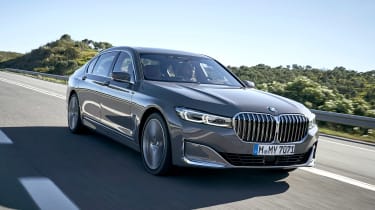New BMW 7 Series facelift 2019 review
How does the facelifted BMW 7 Series limo compare with its Mercedes S-Class and Audi A8 rivals?

In many ways this facelifted 7 Series feels like a new car, and BMW deserves credit for pushing the boat out. The 750i isn’t a wise choice, though; the 730d diesel and 745e plug-in hybrid should be worth an extra half star or so, and will run Mercedes’ S-Class closer than ever.
There really is only one place to start our review of the newly facelifted BMW 7 Series: that grille. In numerical terms, it’s around 40 per cent larger than the previous model’s, but ultimately, there’s one very good reason why BMW’s luxury limo now boasts such an unmissable beak.
Before its facelift, it was guilty of being too modest, and in the company of the always-elegant Mercedes S-Class and the fresher Audi A8, that just wouldn’t do. So BMW has really pushed the boat out with the redesign of this sixth-generation car.
Alongside that brand new, taller front end and slimmer headlights, the new 7 Series receives a bit of attention down the flanks, too. There are new side skirts, plus a pair of right-angled air outlets, while the rear also changes. Like the front end of the car, it gets some smoother surfacing, and is topped off with the latest industry trend: an LED lighting bar running across the width of the rear from one tail-lamp to the other.
We’ll leave it up to you to decide if you like the new look, but you certainly can’t accuse BMW of being lazy with the limo’s redesign. However, the company openly admits that the look has been penned with the Chinese market in mind; more than 40 per cent of all 7 Series are sold there.
Used - available now

2020 BMW
7 Series
32,905 milesAutomaticPetrol3.0L
Cash £30,200
2022 BMW
7 Series
48,357 milesAutomaticPetrol3.0L
Cash £32,700
2020 BMW
7 Series
40,555 milesAutomaticDiesel3.0L
Cash £38,479
2022 BMW
7 Series
29,030 milesAutomaticPetrol3.0L
Cash £40,495Open the doors and you’ll see that the update to the cabin is far less radical. In fact, the basic design is unchanged, but this isn’t necessarily a bad thing; the layouts of the dashboard and switchgear have never been an issue in this generation of the car.
Cosmetic changes include new finishes, trims and leathers, while some fresh new technology has been introduced. There’s a set of digital dials, and the rear seats get an updated control unit and a new entertainment package that features two 10-inch, full-HD monitors. Some new driver-assistance features are fitted, too, so this 7 Series is more up to date than ever.
It does feel suitably plush inside and up to the task in hand, and if you spec your car cleverly, there’s nothing to suggest the latest BMW is any less luxurious than the S-Class. However, we suspect more modest versions of the Mercedes will feel a little bit more special than a basic 7 Series.
Long-wheelbase cars like ours have acres of space and rear-seat passengers won’t be left wanting for room. A three-seat bench is the standard layout, but buyers can also choose a two-seat lounge set-up. This has a full centre console, with reclining, heated and ventilated seats. But while it’s not something we’d usually point out, for a car of this type, the functions aren’t the best.
The 750i, with its 4.4-litre turbocharged V8, will be a bit-part player in Britain, where the six-cylinder 730d we’ve yet to get our hands on will continue to be the biggest seller. We also won’t be offered the long-wheelbase 750 Li model you see here.
Potential owners might wince at the official fuel economy and CO2 emissions of the 750i, but its performance is very strong; the 0-62mph sprint takes just 4.0 seconds and it all happens fairly quietly, with the V8 rumble kept largely distant from the cabin. BMW has added thicker glass and extra soundproofing in the door pillars and wheelarches – and it shows.
We did have a short opportunity to try a production-ready 745Le plug-in hybrid, which switches to a six-cylinder engine in its latest incarnation. It immediately makes far more sense than the 750i as a 7 Series to buy and live with. The Mercedes S 560 e is a more accomplished and technically impressive luxury PHEV limo, but the BMW costs about £14,000 less, so it’s tempting.
Twin-axle, self-levelling air suspension is standard across the range, and this alters its profile, ride height and stiffness based on the driving mode that’s selected.
The 7 Series features a Sport mode, and while it does feel lighter on its toes than an S-Class or A8, it’s still a large and heavy car that’s best driven smoothly rather than sportily. You can slacken the suspension right off in Comfort Plus mode, but this induces a fair bit of body movement on twistier roads. The car’s regular Comfort setting is the best all-round mode, and by and large the 7 Series rides superbly in pretty much every scenario.
Maybe it’s nit-picking to suggest that the S-Class boasts a slightly better ride at speed on motorways, but at this price and in these kinds of cars, small margins such as this can make a massive difference.










